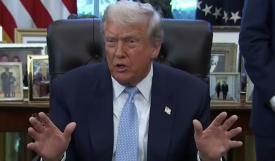Ebola Outbreak Cripples West Africa; 59 Reported Dead in Guinea
A viral outbreak has infected a poor West African nation, testing its weak medical infrastructure and the will of its people. After some deaths and multiple infections, doctors could not pinpoint what was causing it all. Yet, on Saturday, the country's health minister confirmed that the disease was Ebola.
Guinea first reported infections a month ago and now it has been confirmed that the culprit is the virus Ebola. The health minister, Remy Lamah confirmed the presence of the virus after initial tests, according to CNN. The symptoms of the disease include diarrhea, vomiting, and internal and external bleeding. In a writing statement UNICEF stated that 80 have been infected, and of these, 59 have died, including three children.
"In Guinea, a country with a weak medical infrastructure, an outbreak like this can be devastating," the UNICEF representative in Guinea, Dr. Mohamed Ag Ayoya, said in the statement.
The Health Ministry of Guinea warned citizens to be vigilant and informed them that the disease spreads from contact with those infected or to belongings of those sick or dead. In an attempt to help, the international medical charity Medecins Sans Frontieres has pledged 33 tons of medicine and equipment and will begin setting up isolation units in the affected areas.
"Isolation units are essential to prevent the spread of the disease, which is highly contagious," Dr. Esther Sterk, MSF tropical medicine adviser, said in a written statement. "Specialized staff are providing care to patients showing signs of infection."
Though isolation units will help stop the spread of the disease, it is reported that the virus has broken out of the southern rural provinces and has now reached the capital city of Conakry. With a population of more than 2 million people, the port city has just been listed as one of the places with the virus, according to the BBC. The virus has no known cure or vaccine.
"Over the past few days, the deadly haemorrhagic fever has quickly spread from the communities of Macenta, Gueckedou, and Kissidougou to the capital Conakry," read statement from UNICEF quoted by BBC News.
Subscribe to Latin Post!
Sign up for our free newsletter for the Latest coverage!
© 2025 Latin Post. All rights reserved. Do not reproduce without permission.















